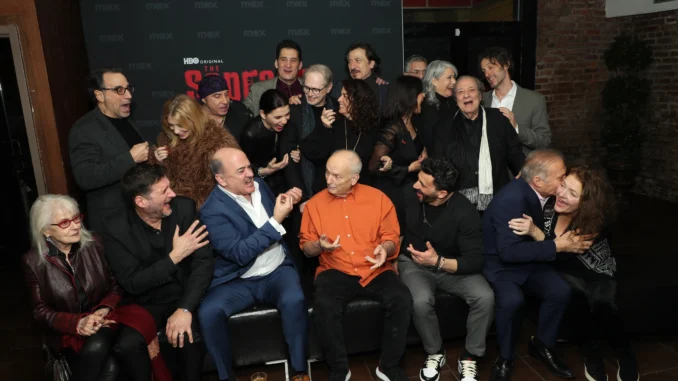
In a world where sensitivity to mental health and trauma is increasingly emphasized, discussions around trigger warnings have become commonplace. But what happens when a celebrated actor from a show known for its gritty realism takes a firm stance against them? Enter The Sopranos alum, who recently voiced strong opinions against the growing trend of trigger warnings in media. Let’s unpack this controversial stance and explore what it means for storytelling, audience engagement, and the legacy of iconic shows like The Sopranos.
What Are Trigger Warnings?
Understanding the Concept
Trigger warnings are notices intended to alert individuals about content that may evoke strong emotional responses, particularly for those with past trauma. They are often used in various forms of media, including books, movies, TV shows, and even social media posts. The idea is simple: to create a safe space for viewers and readers, allowing them to prepare for potentially distressing material.
While the intention behind trigger warnings is undeniably compassionate, the implementation has sparked considerable debate. Some argue that they are necessary tools for mental health awareness, while others believe they undermine the integrity of storytelling.
The Growing Trend
Over the past few years, many platforms and creators have adopted trigger warnings as a standard practice. The aim is to respect audience sensitivities, particularly around issues like violence, sexual assault, and mental illness. However, this trend has also led to criticism that it sanitizes art and dilutes the raw emotions that can make a story impactful.
The Sopranos Legacy
Gritty Realism and Complex Characters
The Sopranos is often hailed as one of the greatest television series of all time, known for its unflinching portrayal of mob life and its psychological depth. The show didn’t shy away from heavy topics, including mental health struggles, violence, and family dynamics. Tony Soprano, played masterfully by James Gandolfini, navigated a world filled with moral ambiguity, often reflecting the complexities of human experience.
In this context, the absence of trigger warnings feels almost fitting. The show’s creators chose to confront difficult themes head-on, trusting that the audience could engage with the material authentically and critically. The emotional resonance of The Sopranos comes from its willingness to explore the darker sides of life without diluting its impact for the sake of comfort.
The Impact on Storytelling
Many believe that trigger warnings can detract from the storytelling experience. The narrative is often more powerful when it forces audiences to confront uncomfortable truths rather than shield them from harsh realities. By labeling certain content as “dangerous” or “distressing,” creators risk diminishing the weight of their stories.
An alum from The Sopranos, in expressing opposition to trigger warnings, highlights this belief: stories can serve as vital platforms for exploring pain, trauma, and healing. The argument follows that shielding audiences from discomfort might ultimately deprive them of valuable insights and growth opportunities.
The Controversy Surrounding Trigger Warnings
Different Perspectives
While some support the inclusion of trigger warnings as a form of empathy and respect, others see them as a form of censorship. Critics argue that constantly anticipating and labeling potentially harmful content can lead to a culture of avoidance, where audiences become reluctant to engage with challenging themes.
The notion that audiences need to be “protected” can come off as patronizing, suggesting that they are incapable of processing difficult emotions on their own. This perspective aligns closely with the ethos of The Sopranos, which thrived on the complexity of its characters and situations, challenging viewers to grapple with their own responses.
A Balance of Sensitivity and Authenticity
Finding a balance between being sensitive to individual experiences and maintaining the integrity of storytelling remains a hot topic. The dialogue around trigger warnings often reflects a broader cultural conversation about mental health, trauma, and the role of media in shaping our understanding of these issues.
Many creators, including those from The Sopranos, advocate for a middle ground: an acknowledgment of the emotional weight of certain topics without over-censoring the art itself. They argue that while it’s crucial to be mindful of viewers’ backgrounds, it’s equally important not to dilute the storytelling process that brings narratives to life.
The Legacy of The Sopranos in the Current Climate
Engaging with Difficult Themes
As society continues to navigate discussions around mental health, trauma, and representation in media, the legacy of The Sopranos stands as a testament to the importance of engaging with difficult themes. The show tackled issues that many would prefer to avoid, offering a raw look at the human condition that resonates to this day.
The criticism from the Sopranos alum sheds light on a critical debate: can we allow art to provoke, challenge, and even discomfort us without feeling the need to soften its impact? Should creators be responsible for preemptively cushioning audiences against the harsher realities of life?
The Role of Audience Agency
In the end, audiences are not passive consumers of media; they bring their own experiences and emotions to the table. The capacity to engage with difficult subjects often leads to deeper understanding and reflection. By trusting viewers to navigate their reactions, storytellers can create richer, more nuanced narratives.
The Sopranos alum’s perspective encourages viewers to embrace discomfort as a natural part of consuming art. It emphasizes that, just as characters evolve through struggle, audiences too can grow by facing the complexities and challenges presented to them.
Conclusion
The debate around trigger warnings and their role in media continues to be a complex and evolving discussion. While they are rooted in empathy and awareness, the pushback from figures like the Sopranos alum highlights the potential downsides of over-caution. As we navigate this landscape, it’s essential to find a balance that respects individual experiences while honoring the integrity of storytelling.
Ultimately, the legacy of The Sopranos serves as a reminder that art can be both challenging and transformative. By engaging with difficult themes head-on, we open ourselves to richer, more meaningful conversations about life, trauma, and healing.
